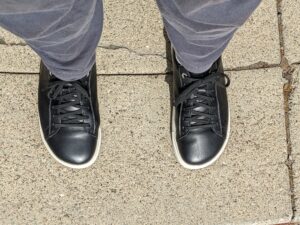I hit 90 last night! But I don’t know why.
Okay, lemme explain.
Six or seven years ago I got a Fitbit for Christmas. Not one of the fancy ones–mostly what I wanted was a wearable pedometer. But by the time I adopted the technology, my Fitbit would tell me all sorts of things about my heart rate, my exercise level, my oxygenation, and yes, my sleep. And I got the Fitbit at about the same time that I began to look at the correlation between sleep and brain health, especially in later life. And six years ago, my sleep scores were… not stellar. Fitbit grades on a 1-100 scale, based on time spent awake and asleep, time spent in each sleep stage (light, deep, REM and awake… which I would not have thought was a sleep stage, but there you go), movement during sleep, and sleeping heart rate. I don’t think I’ve ever gone below 60; the 70s are “fair,” and the 80s are “good.”
If families have mythologies of their own (they do) one of the roles I played, and was weirdly proud of, was “the last person to turn out her light.” This probably grew out of my childhood difficulty in going to sleep–once I was broken of thumb-sucking, anyway. Most nights I would crawl out of bed and sit in the window of my bedroom to read by the streetlight–until my mother discovered that I was ruining my eyes this way. At that point she said “Okay, read until you’re tired, then turn out your own (subvocalized) **damn** light.” From that point on, I usually read until midnight, even as late as 2am. Given that I had to be up at 7 or for to school, I don’t know how I survived. But I did. In fact, throughout most of my adult life I got by on 5-6 hours of sleep a night (with occasional weekend sleep orgies of 10 hours… and that ended when I had kids who wanted my attention regardless of what I wanted).
This, I now know, is not healthy. So for the last six years I have been working on a conversion of manners: I now go to bed around 10pm most nights, read for a while, and (if all goes well) am asleep by 11. Over those last six years I have trained myself to fall asleep faster–breathing techniques, lavender pillows, temperature checks, light-blocking curtains, no screens before bed, reading soporific material–you name it, I’ve tried it. I have worked out a system of sorts, and I am pleased to say that my sleep scores are now almost always in the 80s. Sometimes even in the upper 80s.
But last night I hit 90. Excellent.
I feel like I should get an award. If I could figure out what I did last night to attain excellence I would do it every night. So I checked the statistics.
Last night slept for 7 hours and 13 minutes. I was awake for a total of 31 minutes in tiny increments. I had an hour and 51 minutes of REM sleep. I totaled 4 hours and 22 minutes of light sleep, and 59 minutes of deep sleep. My oxygen variation was low, and my sleeping heart rate was 59. Fitbit only detected movement during 2% of my sleep. That accounts for a 90.
A week or so ago, I slept for 7 hours and 14 minutes. I was awake for 17 minutes, clocked an hour and 27 minutes of REM sleep, 5 hours and 3 minutes of light sleep, and 44 minutes of deep sleep. My oxygen variation was low, but my sleeping heart rate was 69! And I was restless about 5% of the night. My score for that not-terribly-different night? 83.
So what do I learn from all this? A lot of the things that affect my sleep I cannot directly influence. How often I’m awake seems to be a function of whether I’m comfortable, and while I strive to be, obviously in the middle of the night sometimes I’m not. Maybe I’m thinking too much. I cannot, as far as I know, control the quantity of REM sleep I get. Or my sleeping heart rate. Dammit, there are too many variables.
I will note that yesterday we went to see a screening of the Stephen Sondheim musical Merrily We Roll Along (it’s terrific) and I know that the music inserted itself into my dreams. Maybe the secret to upping my sleep score is musical theatre?
Stranger things have happened.

